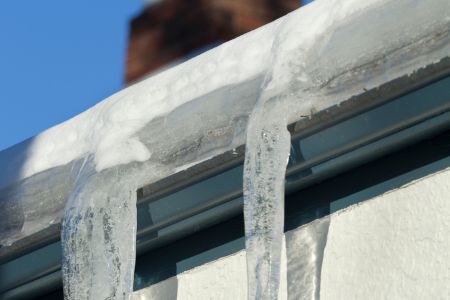Don't Let Your Holidays Go Down the Drain! Prevent Winter Water Damage
Tips and Tricks for Protecting Your Property
Winter is beautiful and associated with the holidays, but it also brings the potential for problems with freezing temperatures, snow, and ice. The risk of water damage to residential properties increases significantly. Knowing what steps to take to protect your home can make all the difference in preventing costly repairs and preserving the safety and comfort of your living space.
Steps to Dodge Freezing Pipes
One of the most common causes of winter water damage is frozen pipes. When water freezes, it expands. This action causes pipes to burst and the pressurized water to flow freely. Open cabinet doors to allow warm interior air to circulate, and turn on the taps at a trickle where possible. Insulate exposed pipes in these areas:
- Basements
- Attics
- Crawl spaces
- Against unheated walls
Make Sure Your Gutters are Clean
When gutters become clogged with leaves, ice, or debris, foundation pooling can lead to leaks and damage. Cleaning your house gutters regularly can help avoid this issue, but it is especially important in the autumn to clear out fallen leaves. Be sure to extend downspouts to direct water away from your home.
Check Your Roof
A roof in good condition is essential for keeping your home dry during the winter. Snow and ice can strain your roof, and any damaged or missing shingles can lead to leaks and water damage. Inspect your roof monthly for any signs of wear, such as cracked or loose flashing and missing shingles, and make repairs before winter sets in to prevent leaks from snow and ice accumulation.
Make Sure Your Sump Pump is Ready
Sump pumps help prevent basement flooding, but you could face severe water damage if it fails. Conduct testing on your sump pump regularly to ensure it functions properly. Battery power packs for these pumps can save the day during a power outage.
Be Alert for the Formation of Ice Dams
Damaging ice dams can form when heat from your home causes snowmelt on your roof and refreezes at the eaves. This situation can lead to water pooling behind the ice, seeping under shingles, and damaging your ceiling and walls. A well-insulated attic is vital to preventing ice dams.
Seal Up Cracks and Foundation Gaps
Cold air and water can enter your home through cracks and gaps in your foundation, doors, and windows, leading to water damage and higher heating bills. Inspect your home regularly for cracks or gaps and seal them with caulk or weatherstripping. If winter water damage occurs, acting quickly to minimize it is essential. AdvantaClean is here to help with professional water damage restoration services. Our team has the experience and expertise to handle water damage from frozen pipes, ice dams, or basement flooding.

Call AdvantaClean today at (877) 800-2382 or visit advantaclean.com to learn more about how we can help protect your home from winter water damage and restore it if the unexpected happens.